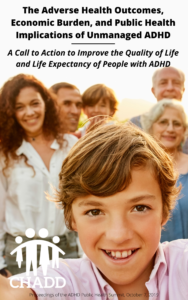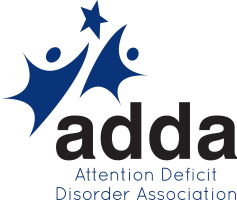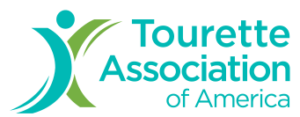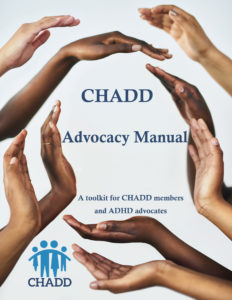Advocacy
CHADD is part of a social movement that seeks to shape the conversation on how society treats, accommodates, and views people affected by ADHD. Our movement is made up of countless people affected by ADHD, their families, teachers, friends, and leaders in the fields of ADHD research, education, and mental health. We realize the most effective way to accomplish our goals is through sustained and strategic outreach to policymakers on the state and federal levels.
We are making a difference for families and adults affected ADHD. And we need your help! We want you to be equipped with information to make a difference in your own life, whether that means dealing with issues in the classroom, the boardroom, or your living room.
CALL TO ACTION
Your Support and Advocacy Matters
Your voice matters. Your experience with ADHD matters. Now is the time for you to take action and be an advocate for the ADHD community in whatever way you are able to contribute.
CURRENT ISSUES
Posted October 8, 2020 Presentation to the Joint Meeting of the Psychopharmacologic Drugs Advisory Committee and the Drug Safety and Risk Management Advisory Committee of the US Food and Drug Administration Public Meeting on Patient-Focused Drug Development for Stimulant Use Disorder Presented by Robert Cattoi, CHADD Chief Executive Officer Children and Adults with Attention-Deficit/Hyperactivity Disorder…
CHADD is pleased to report that Secretary of Education Betsy DeVos will not seek changes to the central tenets of the Individuals with Disabilities Education Act (IDEA) in response to the novel coronavirus pandemic. In her report, the Secretary is “not requesting waiver authority for any of the core tenets of the IDEA or Section…
Read the update to this post. Dear Parents, The Coronavirus Aid, Relief, and Economic Security (CARES) Act, PL 116-136, directs Secretary of Education Betsy DeVos to report back to Congress no later than April 26, 2020, on any waivers needed under the Individuals with Disabilities Education Act (IDEA) and the Rehabilitation Act of 1973 (Section…
The CHADD Public Policy Committee is sharing the document Questions and Answers on Providing Services to Children with Disabilities during the Coronavirus Disease 2019 Outbreak. This document addresses questions on IDEA and Section 504 educational plans, along with meeting the needs of children with disabilities who may also be affected by COVID-19. The Centers for…
The US Food and Drug Administration recently asked for comments on making stimulant medications more difficult to abuse and how those changes could affect the millions of people who include medication in their ADHD treatment plans. The Federal Register notice states that stimulant medications can be open to abuse but that reformulating them can potentially…
At eight years old, Michael was diagnosed with ADHD. The traditional city school he attended declined to evaluate him to determine eligibility for special education and related services because his grades were above average. Instead, the school provided Michael with minimal accommodations through a 504 plan. As the years progressed, Michael’s grades began to decline,…
- « Previous
- 1
- 2
- 3
- 4
- Next »
ADVOCACY PARTNERS
FEDERAL GOVERNMENT
ADULT ADHD GUIDELINES DEVELOPMENT
The recent surge in adults seeking care for ADHD, coupled with a steady increase in ADHD medication prescriptions, has underscored the pressing need for diagnostic and treatment guidelines.
To address this issue, CHADD has partnered with the American Professional Society for ADHD and Related Disorders (APSARD) to develop and distribute guidelines in 2025. APSARD is leading the charge in developing the guidelines for review. CHADD is taking the lead in developing resources and toolkits for healthcare providers across the United States to implement the new diagnostic and treatment guidelines.
WEBINARS
Analysis and Impact of Federal Healthcare and Education Policies
Several proposed federal policies have the potential to affect ADHD diagnosis, treatment, and educational support for individuals and families. Experts in ADHD diagnosis and treatment will review research-based responses to the Make America Healthy Again (MAHA) Commission's claims about ADHD. They will also discuss the critical role the US Department of Education plays in supporting students who have ADHD.
Previous Lunch and Learn Webinars
The Importance of Adult ADHD Guidelines
Dr. Peter Jensen, founder of The REACH Institute, is the director of a coalition of organizations developing adult ADHD diagnosis and treatment guidelines for use in the United States, a joint effort of CHADD and APSARD.
For more information on the development of adult guidelines, read The Quest for Clinical Practice Guidelines for ADHD in Adults.
What Is ADHD? How It Affects Children and Adults
Max Wiznitzer, MD, discusses the medical science of ADHD and how it is expressed in children and adults. ADHD impairs many aspects of life, and it is important that the public and policymakers have an understanding of the disorder when addressing laws and policies regarding ADHD and its treatment.
RESOURCES
WHITE PAPER
 The Adverse Health Outcomes, Economic Burden, and Public Health Implications of Unmanaged Attention Deficit Hyperactivity Disorder (ADHD): A Call to Action to Improve the Quality of Life and Life Expectancy of People with ADHD
The Adverse Health Outcomes, Economic Burden, and Public Health Implications of Unmanaged Attention Deficit Hyperactivity Disorder (ADHD): A Call to Action to Improve the Quality of Life and Life Expectancy of People with ADHD
Proceedings of the ADHD Public Health Summit
Washington, DC
October 7, 2019
Presented by Children and Adults with Attention-Deficit/ Hyperactivity Disorder (CHADD)











 CHADD Advocacy Manual
CHADD Advocacy Manual